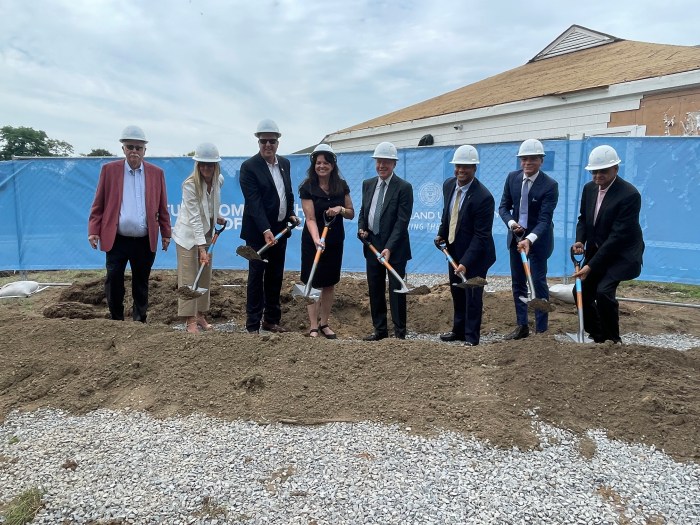The Town of Oyster Bay Landmarks Preservation Commission (LPC) voted 5 to 1 at their Wednesday, May 13 meeting to accept the new architectural plans for the renovation of the Maine Maid Inn, reflecting suggestions made by board member John Collins to the plans by architect Angelo Francis Corva that were reviewed at the board’s previous meeting on April 30. Collins voted no, more to express concern over how the town landmark regulations were bypassed rather than concern over the changes.
“You captured the spirit of the Italianate style of the inn, to a certain percentage,” said Collins to Corva. He added, “As good as it is, since the commission has never accepted the National Guidelines for Historic Preservation, it was the most they could require of the developers.”
Collins said he was most saddened by the fact that “no historic fabric will survive.” In a way, the destruction of the building began in the 1980s when all the window frames were pulled out and the windows replaced with none of the original material retained.
“The shingles are still there,” he said, hoping that they might be used.
A Glitch In The Process
While the commission is allowing the work to continue as the Scotto Brothers create a new Maine Maid Inn, there are still questions to be answered about why the plans were never brought to the commission and who signed the work permit.
When a Town of Oyster Bay building permit is asked for from the Department of Planning and Development, all landmark buildings must go before the TOB LPC for a review of the plans. The commission oversees the part of the building the public sees “walking by” to reflect the historic value of the site. It does not have the power to change the inside of the building.
In return for landmark sites having an extra step in their permit process, the town gives them a 15 percent rebate on their town taxes.
In the case of the inn, this process was skipped and Joel Snodgrass, a preservation professional with 30 years of experience, said at the meeting that landmark buildings are red flagged and that New York State requires it.
“Without that happening you will make your own future more difficult,” said Snodgrass. “The commission is there to assist people in restoration before a dime is spent on design, before any effort is made.”
Snodgrass said the big thing is to find what is important at a site.
He said: “If the Declaration of Independence was signed in a shack, that shack is worthy of preservation.”
In the case of the Maine Maid Inn, it is believed to have been a station on the Underground Railroad and as of now, all that interior history has been gutted.
Matthew Meng, president of the East Norwich Civic Association, the group that funded the research and presentation for the Landmarks Commission and the Town of Oyster Bay to request that the Maine Maid Inn be given landmark status, said: “It is the rules and regulations of the town’s commission that is what is important, [just] like the Constitution.”
The meeting had begun with a presentation by Richard Handler, Esq., the preservation expert originally hired by ENCA to speak at the meetings to landmark the Inn. Meng said on May 15 that Handler was preparing to serve a court-ordered injunction to stop the construction until the issues are resolved.
“We are challenging the whole process since it did not follow the town’s LPR rules,” said Meng.
Currently the permit process has not been transparent; the permit seems to be missing and therefore no one knows who signed it, circumventing the process. During the meeting, Massapequa resident Robert Ripp asked about the permit and TOB LPC Acting Chairman Michael Spinelli said the town attorney has received a FOIL request to find out who signed the permit and that he had no answer until then.
“Commissioner Ippolito is a member of the (LPC) board,” said Ripp. “If he did it [sign the permit] the board should look at itself.”
He later commented that all seven members of the commission are appointed by the town board, saying that it should be a 50/50 representation with half the members from the general public.
Ripp had spoken before the town board on Tuesday, May 12 about the Maine Maid Inn. In response, Supervisor John Venditto commented that the board was glad that the Scotto Brothers purchased the site since they have a history in the food industry and the public should get a quality restaurant/venue.
“It is very clear. There has to be a timeline that has to be followed or the town isn’t following its own regulations,” said Meng at the Wednesday evening LPC meeting.
“As for the board, for the past 13 years it has had an acting chairperson,” Meng continued. “There has been no chairman since Dorothy Horton McGee died while holding that office. If you add to that the commission’s not accepting the National Preservation Guidelines, they have something to answer for to the public.” [Horton died on Sunday, Oct. 12, 2002 in her Locust Valley apartment at the Piping Rock Country Club. She served as chair from 1982 to then.]
As the meeting ended the public continued to talk about the issues. Several people were looking at a large photo of the south side of the Maine Maid Inn that faced Jericho Turnpike before the state destroyed the small area to create the cloverleaf where Route 107 and 106 intersect with the turnpike. The entrance used by the Inn is on the north side of the site. The Inn had been expanded on the south side as well as on the sides.
Currently the site is fenced in and has a green-netting that blocks the site from view although there are some small slits in it.
Out in the middle of the road is the large sign advertising that Breslin Realty is to be contacted by interested buyers. It is bent and discarded among some bushes in the center of the road leading to the inn between the inn and the turnpike.
Peering in you can glimpse parts of the original building hidden before by additions to the inn.


































